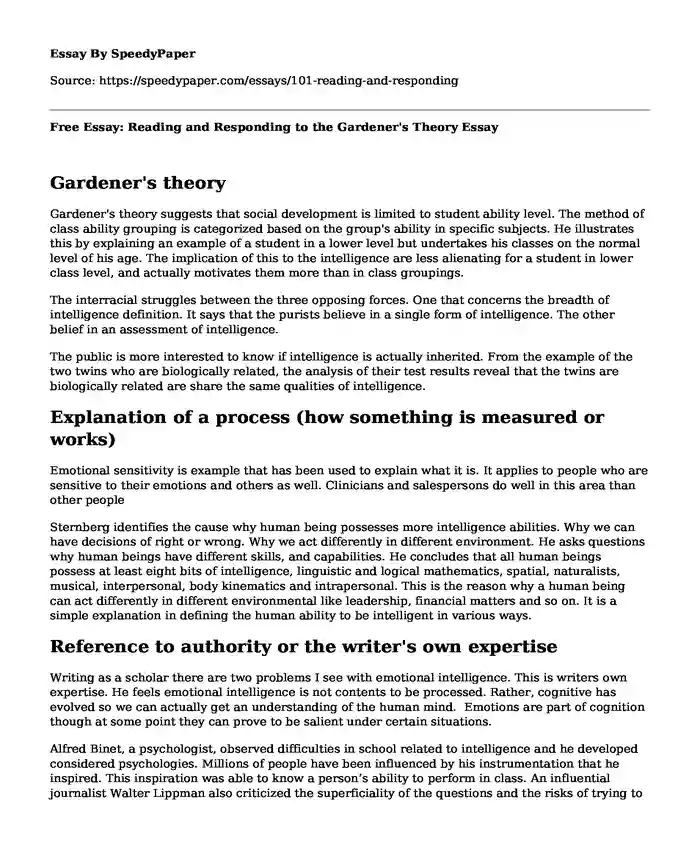
| Type of paper: | Essay |
| Categories: | Education Psychology Intelligence |
| Pages: | 2 |
| Wordcount: | 490 words |
Gardener's theory
Gardener's theory suggests that social development is limited to student ability level. The method of class ability grouping is categorized based on the group's ability in specific subjects. He illustrates this by explaining an example of a student in a lower level but undertakes his classes on the normal level of his age. The implication of this to the intelligence are less alienating for a student in lower class level, and actually motivates them more than in class groupings.
The interracial struggles between the three opposing forces. One that concerns the breadth of intelligence definition. It says that the purists believe in a single form of intelligence. The other belief in an assessment of intelligence.
The public is more interested to know if intelligence is actually inherited. From the example of the two twins who are biologically related, the analysis of their test results reveal that the twins are biologically related are share the same qualities of intelligence.
Explanation of a process (how something is measured or works)
Emotional sensitivity is example that has been used to explain what it is. It applies to people who are sensitive to their emotions and others as well. Clinicians and salespersons do well in this area than other people
Sternberg identifies the cause why human being possesses more intelligence abilities. Why we can have decisions of right or wrong. Why we act differently in different environment. He asks questions why human beings have different skills, and capabilities. He concludes that all human beings possess at least eight bits of intelligence, linguistic and logical mathematics, spatial, naturalists, musical, interpersonal, body kinematics and intrapersonal. This is the reason why a human being can act differently in different environmental like leadership, financial matters and so on. It is a simple explanation in defining the human ability to be intelligent in various ways.
Reference to authority or the writer's own expertise
Writing as a scholar there are two problems I see with emotional intelligence. This is writers own expertise. He feels emotional intelligence is not contents to be processed. Rather, cognitive has evolved so we can actually get an understanding of the human mind. Emotions are part of cognition though at some point they can prove to be salient under certain situations.
Alfred Binet, a psychologist, observed difficulties in school related to intelligence and he developed considered psychologies. Millions of people have been influenced by his instrumentation that he inspired. This inspiration was able to know a person’s ability to perform in class. An influential journalist Walter Lippman also criticized the superficiality of the questions and the risks of trying to know someone's intelligence ability by simply asking oral and paper-and-pencil procedures. His criticism championed more research on the subject of intelligence as many scholars and the community studied the human mind to uncover its unlimited abilities. It generally provided advancement in the following decades following Binet's and Terman's contributions.
Cite this page
Free Essay: Reading and Responding to the Gardener's Theory. (2018, Dec 17). Retrieved from https://speedypaper.net/essays/101-reading-and-responding
Request Removal
If you are the original author of this essay and no longer wish to have it published on the SpeedyPaper website, please click below to request its removal:
- Free Essay Describing Kolb's Experiential Learning Model
- Culture Essay Sample about Wedding Ring
- Free Essay on Defining Culture with Race, Class, and Gender
- Free Essay Example on Customer Satisfaction
- Essay Example: Pro-Choice vs. Pro-Life
- Article Review Essay Example about Behavioral Intervention in Autistic Children
- Examining Drug and Substance Abuse as a Social Problem: Essay Sample
Popular categories




